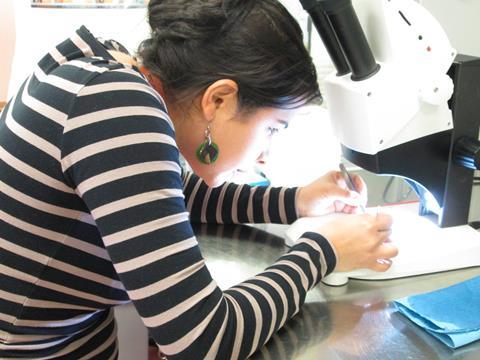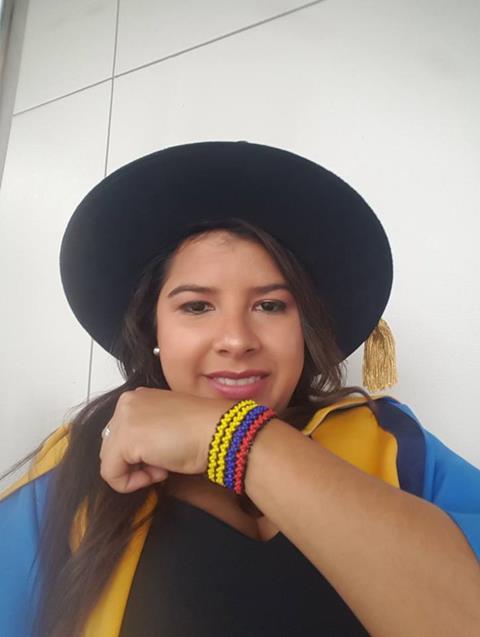As a regular attendee of the Green-Era Hub project presentations (keep reading to find out more about this!), I came across Evelyn Zuñiga, the person chairing all of these webinars. The presentations have been fantastic, but I was also intrigued by Evelyn, a fellow Latin American, and by her role. In this article, Evelyn shares with us her scientific journey from being a curious child in Colombia to coordinating the European Green-Era Hub webinars from the Agriculture and Food Development Authority in Ireland.
I could say that my passion for science and discovery started when I was around 10 years old, when my mom gave me one of the most wonderful Christmas gifts that I have ever received: a microscope! Said microscope came with a small starter pack of prepared slides, some basic chemicals, and suggestions of what other structures could be scrutinized under the lens. Once I started preparing my own samples, I was absolutely fascinated with the world of micro-structures that could be found in different organisms, and even in a simple drop of water!
Throughout my school years, I remained fascinated by animals, plants, and life on earth in general. However, I decided to take the path of molecular biology, when in a high school science lecture I learned about a structure that is impossible to see with the naked eye, and yet can control and regulate processes inside cells with the precision and versatility of a Swiss army knife: the DNA molecule!
Fast forward to 2005. I was completing my Bachelor’s final-year project at Universidad del Valle in Cali-Colombia. This project was related to the characterization of a DNA fragment in a polymorphic protein from one of the infective stages of the malaria parasite. In this work I conducted DNA isolation, sequencing, and phylogenetic analysis of the samples; it was very interesting to find out how samples from geographically distant regions (i.e., Thailand) had common elements with our Colombian samples and how this could be associated with human migration pathways.

After I completed my undergraduate degree, I was a science teacher for children between 8 to 15 years old. This allowed me to develop the ability to transform complex biological concepts into simple terms for the kids to understand. In perspective, I consider that this was a fantastic tool to learn at such a young age for me!
I enjoyed very much my time as a science teacher; however, my passion for learning and experimenting in the lab never went away, and I decided to pursue my Master’s degree. This time, my Master’s thesis was oriented toward plant biotechnology and the exploitation of DNA technology to design genetically modified carrot plants with valuable traits.
After finishing my Master’s degree, I joined the International Center for Tropical Agriculture (CIAT) as a Research Assistant. During this time, I explored the genetic transformation of different rice varieties using a novel species of bacteria called Ensifer adhaerens. Fast forward to 2014, I travelled from Colombia to Ireland to continue my research on E. adhaerens in more depth, but this time as a PhD researcher.
After completing my PhD, I had the opportunity to conduct my first postdoctoral research at the University of Florida-Gainesville, under the guidance of Prof. Fredy Altpeter. During this time, my focus was on applying genetic transformation techniques to sugarcane with the aim of enhancing its oil content. This research aimed to contribute to the advancement of biodiesel production from renewable sources. For my second postdoc I moved away from the realm of plants and worked in the functional and genetic characterization of a human pathogenic yeast called Candida parapsilosis. I was thrilled with this experience because besides learning multiple techniques to work with yeast, I was finally able to learn how to use liquid handling robots and perform DNA sequencing using Illumina kits and platforms.

Currently, I work in the Research Support Office at the Agriculture and Food Development Authority (Teagasc-Ireland) as one of the Research Coordinator Officers for the Green-ERA Hub project. The objective of this initiative is to provide clear perspectives in the Agri-food and biotechnology sector to find dedicated support at the level of information, communication, cooperation, networking and joint transnational funding. Our main goal is to strengthen Europe’s highly competitive position in agri-food and biotechnology research.
As part of these objectives, one of my main tasks is to organize webinars targeted to Early Career Researchers, who work in the field of agriculture, sustainability, and biotechnology. So far, I have organized webinar series’ on three diverse topics: i) Circularity in Agriculture; ii) Biotechnology to Advance Sustainable Solutions for Bioeconomy, and iii) Sustainable Food Systems. These are available to view on Green-ERA Hub’s YouTube channel.
The experience of coordinating these webinars with such diverse topics has definitely opened my mind to different aspects of research and innovation within these fields. It has allowed me to dig deeper into various areas and engage with experts from diverse backgrounds. Additionally, the experience has reinforced the importance of effective communication in disseminating knowledge and fostering collaboration among researchers from different parts of the world. Overall, it has been a rewarding journey that continues to inspire me in my role as a coordinator and advocate for research advancement in agriculture and biotechnology.








No comments yet